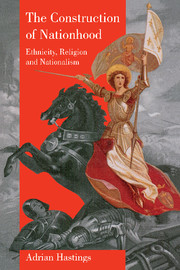8 - Religion further considered
Published online by Cambridge University Press: 05 June 2012
Summary
We all know the story of how Stalin remarked derisively ‘The Pope: how many divisions has he got?’ It is an ironic commentary upon the futility of that question that the Stalinist empire fell apart at the point when it had to recognise that Catholic nationalist Poland was the one entity which it absolutely could not digest. Stimulated by a Polish Pope, an answer had been given. One could add that the one entity which the British Empire, despite centuries of bullying, absolutely failed to digest was Catholic nationalist Ireland. And if there is one area of Europe today which has absolutely failed to conform to its liberal standards of political behaviour, it is Orthodox nationalist Serbia. In each case we see the defiant power of a nationalism grounded in religious identity. The bond between nationalism and religion has seldom been so deeply rooted or so powerful as in these three cases, yet most of Europe's nationalisms have had fairly close religious ties, as we have seen particularly in regard to England. There have, nevertheless, been a few nationalisms, such as those of Scotland, Switzerland and Italy, where religion has played no more than a rather subsidiary role.
This chapter will look at our subject again from the religious end, discussing, first, a variety of ways in which religion contributes powerfully to nation-construction and nationalism, and, secondly, the universalist and anti-nationalist dimensions of Christianity and Islam. Throughout this book the examples studied have almost all been Christian ones.
- Type
- Chapter
- Information
- The Construction of NationhoodEthnicity, Religion and Nationalism, pp. 185 - 209Publisher: Cambridge University PressPrint publication year: 1997



